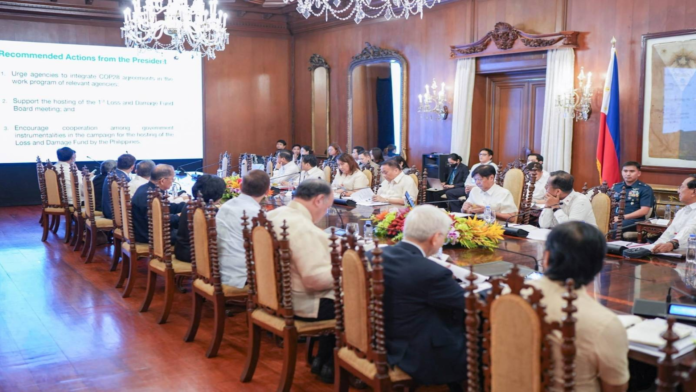President Ferdinand R. Marcos Jr. has directed concerned agencies to implement the National Adaptation Plan (NAP) 2023-2050 and conduct an intensified public awareness campaign in “high-risk” regions, Malacañang said on Thursday.
Marcos issued the directive during a meeting with the Department of Environment and Natural Resources (DENR) and other concerned agencies at Malacañan Palace in Manila on Wednesday to discuss the key outcomes of the 28th Conference of the Parties (COP28), Communications Secretary Cheloy Garafil said in a statement.
Garafil said the NAP 2023-2050 and the draft Nationally Determined Contribution Implementation Plan (NDCIP) 2023-2030 were also presented to Marcos during the meeting.
In his meeting with the DENR and other concerned agencies, Marcos said all efforts under the NDCIP and NAP must be in the interest of the Philippines, especially those in high-risk areas.
“It’s a big, big (task). This covers three decades and the entire country. It’s a completely different situation when it comes to climate change. Anyway, I think that’s the approach that we should take. We have to try and work our way down through the system—the economic system—so that we can address the specific situations, the specific conditions (of each area),” Marcos said, as quoted by the Presidential Communications Office.
“The best that we can do is number one, be very specific on what is necessary for the Philippines. If we take care of the Philippines, we can bet with confidence that we are doing our part. So, asikasuhin muna natin ‘yung Pilipinas (Let’s take care of the Philippines first), what is good for us. So, the communities that are high risk, ano kailangan nila (What do they need)? Let’s focus on that,” he added.
Marcos also emphasized the importance of providing guidance and assistance to areas that need support from various local government units (LGUs) to improve climate change mitigation efforts at a local level that would benefit the country as a whole.
He said concerned government agencies and LGUs must have a full comprehension of the NDCIP 2023-2030 and NAP 2023-2050 to ensure the effective implementation of the plans.
He added ordinary people must also have a full grasp of the two plans, as well as of the risks posed by the changing climate.
DENR Secretary Maria Antonia Yulo-Loyzaga told Marcos about the several ongoing bilateral projects that deal with adaptation and resilience of LGUs.
Yulo-Loyzaga said the projects include the ongoing USD15-million to USD16-million Strengthening Institutions and Empowering Localities Against Disasters and Climate Change in the Philippines (SHIELD) project backed by Australian government and a United States (US)-funded project called Climate Resilient Cities focusing on metropolis.
“There is a Canadian offer for another… also LGU-based for adaptation. So kasama po namin ang DILG (So, the DILG is involved) in these particular implementations. So, there is already bilateral funding, specifically for the localization of adaptation and resilience,” she said.
In a statement posted on state-run Radio Television Malacañang, Marcos also expressed his intention to engage the private sector and development partners to strengthen the country’s climate change adaptation and disaster risk management.
Marcos also stressed the need to participate in international environmental events, saying such participation would contribute to an influential and resourceful actions in combating climate change in the Philippines.
In December last year, the DENR and the Climate Change Commission (CCC), in partnership with the Asian Development Bank and the government of the United Kingdom, conducted a high-level panel discussion on the Philippines’ commitment in the NAP and NDCIP.
The discussion also served as a platform in mobilizing financing for these national plans.
The NAP aims to steadily reduce climate-related loss and damage as well as build the country’s adaptive capacity towards transformative adaptation, resilience and sustainable economic development by 2050.
The NDCIP, on the other hand, is the Philippines’ commitment to the Paris Agreement which sets to bring about sustainable industrial development; eradication of poverty and provision of basic needs; securing social and climate justice; and energy security. (PNA)
Photo credit: Facebook/BongbongMarcos


